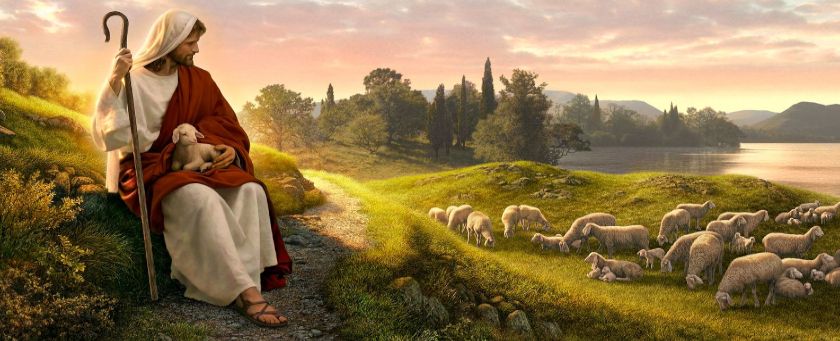Jesus is the Good Shepherd
Fourth Sunday of Easter, Year A

Readings:
Acts 2:14a, 36-41; Ps. 23; 1 Pt. 2:20b-25; Jn. 10:1-10
(Audio recorded live, 30 April 2023)
“The Lord is my shepherd; there is nothing I shall want,” words taken from today’s Psalm remind us that the Lord watches over and tends his flock. For centuries the imagery of the shepherd has been used as a metaphor for kings. We remember how David, before becoming king of Israel, was tending the flocks of his father Jesse; we remember how the prophet Ezekiel exhorts the leaders of Israel to pasture the flocks (See Ez. 34:2); we remember how St. Peter encourages leaders to tend the flock of God in your midst (1 Pt. 5:2); and today we remember how Jesus reveals himself as the Good Shepherd. Jesus says, “I am the gate for the sheep. Whoever enters through me will be saved, and will come in and go out and find pasture.”
When I was a young boy, I lived next to my Uncle Charlie. Our property had very little land since most of it was occupied by the house, the driveway, and a rehearsal studio in the back yard. Fortunately, Uncle Charlie had a nice open stretch of land that me and my siblings and friends would use to play tag, baseball, football, soccer, Frisbee, you name it. There was a fence between my yard and Uncle Charlie’s, and we used to climb the fence to get into his yard. But, after many repeated attempts to climb this fence, the poles began to weaken. I remember how my Uncle Charlie used to urge us to walk around to the gate, so as not to cause any more damage to the fence. He had no problem with us using the yard; he merely wanted us to enter through the gate. In a sense, my Uncle Charlie was being the gatekeeper, so that we could come in and go out and find pasture in his yard.
Jesus says, “I am the gate.” In this sense, he is talking about how he is the way, the truth, and the life; how no one comes to the Father except through him. We have already entered through the gate when we were baptized. And now we come in and go out and find pasture in his Church, which is an image of the Kingdom to come.
Jesus uses the images of the shepherd and the gate to help the Pharisees better appreciate why he was sent. Throughout the history of Israel, there were many wicked shepherds in the form of selfish and idolatrous kings. They often exploited widows and orphans, or did little to help them. In a word, they failed to care for what was entrusted to them; they were more focused on their own interests rather than the will of Almighty God. Jesus says, “I came down from heaven not to do my own will but the will of the One who sent me” (Jn. 6:38). Jesus ushers in a new paradigm by shepherding disciples and showing them the way to the Father.
I have many fond memories of being in my Uncle Charlie’s yard. As I grew older, I used to cut the grass there with the good old push mower. I will never forget the feeling of accomplishment sitting at the picnic table with a glass of iced tea and looking over that freshly cut grass. It was not my property, but I was proud to take care of it. It is not much different in the Church. We are all part of God’s flock, and we are all called to care for what has been entrusted to us.
This Sunday is the 60th World Day of Prayer for Vocations. In the Church there are two primary vocations: the priesthood or consecrated life, and marriage. Today, we focus especially on the Church’s need for priests and deacons to tend the flock in our midst. I am humbled by the upcoming opportunity to soon serve as a pastor. But, I would be remiss if I did not stress upon us all the importance of praying for those men discerning a vocation to the priesthood or diaconate. The Lord has a plan for each of us, but sometimes it is difficult to discern that plan, especially with all the noise of radio, television, media, and internet. If not for the prayers of so many faithful, I might not be here today.
And so, as we continue to reflect on how Jesus is our shepherd, our king, and how he is the gateway to the Father, let us be mindful of our own desire to be close to him, as sheep to their shepherd, for he is always close to us, especially when we approach this altar and receive him into our hearts.





Share this post
Twitter
Facebook
Pinterest
Email